|
|
|
Sort Order |
|
|
|
Items / Page
|
|
|
|
|
|
|
| Srl | Item |
| 1 |
ID:
082679


|
|
|
|
|
| Publication |
2008.
|
| Summary/Abstract |
From Byron's death at Missolonghi in 1824 to D'Annunzio's capture of Fiume for Italy in 1919, the nationalism of universal liberalism and independence struggles changed, in literature as in politics, to cruel dictatorial fascism. Byron was followed by a series of idealistic fighter-poets and poet-martyrs for national freedom, but international tensions culminating in World War I exposed fully the intolerant, brutal side of nationalism. D'Annunzio, like Byron, both a major poet and charismatic war leader, was a key figure in transforming nineteenth-century democratic nationalism into twentieth-century dictatorial fascism. The poet's 'lyrical dictatorship' at Fiume (1919-20) inspired Mussolini's seizure of power in 1922, with far-reaching political consequences. The poet became the dangerous example of a Nietzschean Übermensch, above common morality, predatory and morally irresponsible. This article shows how the meaning of nationalism was partly determined and transformed by poets, illustrating their role as 'unacknowledged legislators of the world'
|
|
|
|
|
|
|
|
|
|
|
|
|
|
|
|
| 2 |
ID:
025385
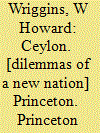

|
|
|
|
|
| Publication |
Princeton, Princeton University Press, 1960.
|
| Description |
xiii, 505p.hbk
|
|
|
|
|
|
|
|
|
|
|
|
Copies: C:1/I:1,R:0,Q:0
Circulation
| Accession# | Call# | Current Location | Status | Policy | Location | IssuedTo | DueOn |
| 021340 | 954.93/WRI 021340 | Main | Issued | General | | RF167 | 18-Apr-2024 |
|
|
|
|
| 3 |
ID:
102112
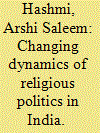

|
|
|
| 4 |
ID:
081236
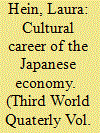

|
|
|
|
|
| Publication |
2008.
|
| Summary/Abstract |
This essay explores the connection between the economy and cultural identity in Japanese nationalism and the intellectual discourses that have historically defined it. Nationalism in the pre-war period was closely associated with the anxiety that Japanese modernity was deformed. After World War II Japan was part of the global trend towards developmental nationalism, including a transformation of its economy into both a wealthy and a highly egalitarian one. In the 1970s and 1980s ethnic nationalism re-emerged, this time arguing that economic success was the product of Japanese cultural uniqueness rather than of the developmental nationalist policies of the previous quarter-century. The economic downturn of the 1990s thus challenged Japan both economically and culturally, and reawakened anxieties about Japanese deformity. At first, this crisis led to a critical re-evaluation of national culture, manifested as serious attempts to both resolve tensions with Asia dating from World War II and to dismantle domestic social hierarchies. By the mid-1990s, however, this moment had passed and government and business leaders adopted fully fledged neoliberal policies, reversing the long postwar trend towards income equality, also expressing a more strident and militarist cultural nationalism
|
|
|
|
|
|
|
|
|
|
|
|
|
|
|
|
| 5 |
ID:
114199
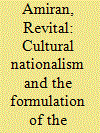

|
|
|
|
|
| Publication |
2012.
|
| Summary/Abstract |
Regarding culture as the very basis of the concept of a nation, this article reflects on cultural nationalism's attitude towards the idea of a nation-state and national-political life. I will suggest that cultural nationalism is a concept that inevitably invokes the aspiration that art will overcome political life, undermining its role to provide the soon-to-be citizens with an adequate arena on which to contest their ethics. Thus, cultural nationalism might prevent politics from being involved in questions of identity and may imply some questionable consequences regarding democratic values such as individual autonomy. Hence, cultural nationalism keeps open the option to contradict its own intrinsic postulation that aims for self-sovereignty. This claim will be demonstrated with the case study of the Jewish national movement and more specifically through the examination of the writings of two important literary personae within it: David Frishman and Micha Joseph Berdichevski.
|
|
|
|
|
|
|
|
|
|
|
|
|
|
|
|
| 6 |
ID:
162844
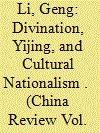

|
|
|
|
|
| Summary/Abstract |
By aligning themselves with the Book of Changes (易經 Yijing) and
National Learning (國學 Guoxue), diviners in contemporary China
regard themselves as protectors of “traditional culture” and promoters
of “China’s national wisdom.” �e alignment with the national tradition not only enhances divination’s social status, but also generates
more pro�t for diviners and constructs a limited a�nity with o�cial
ideology. Diviners can shi� their public image from being typical
representatives of backward feudal superstition to being in the
vanguard of a traditional culture that is essential to China’s national
identity. All of this is occurring against the background of China’s
national project of global reordering and promoting cultural nationalism. The reactivation of elements of the cultural patrimony is
regarded as useful to legitimize state power and to fortify national
cohesion. While popular religious practices o�en maintain an alternative view to that of the state, they also develop connections with hegemonic discourses, dynamically and strategically.
|
|
|
|
|
|
|
|
|
|
|
|
|
|
|
|
| 7 |
ID:
050927
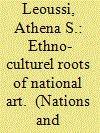

|
|
|
|
|
| Publication |
Jan-Apr 2004.
|
|
|
|
|
|
|
|
|
|
|
|
|
|
|
|
| 8 |
ID:
117908
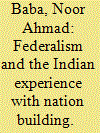

|
|
|
|
|
| Publication |
2011.
|
| Summary/Abstract |
For plural societies like India, the only workable strategy of nation building is to provide all segments of society with an equal sense of belonging, respect and security. The Indian constitutional framework, despite some assimilationist influences, was broadly drawn on accommodationist lines. As a matter of policy, India adopted cultural pluralism rather than an assimilationist brand of cultural nationalism. The Constitution allowed federalism to develop and evolve as a dynamic process, despite certain inbuilt limitations that undermined its functioning in its initial three decades. Nevertheless, there has never been a consensus in India about using special provisions/autonomy as a strategy of nation building or as a mechanism of problem solving. Such an arrangement in the context of Kashmir was seen as an aberration and a potential source of disunity for the country. However, the erosion of Article 370 has undermined rather than promoted the cause of national integration in relation to Kashmir.
|
|
|
|
|
|
|
|
|
|
|
|
|
|
|
|
| 9 |
ID:
126137
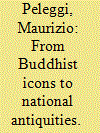

|
|
|
|
|
| Publication |
2013.
|
| Summary/Abstract |
In the mid 1920s Prince Damrong Rajanubhab and George Coedès jointly formulated the stylistic classification of Thailand's antiquities that was employed to reorganize the collection of the Bangkok Museum and has since acquired canonical status. The reorganization of the Bangkok Museum as a 'national' institution in the final years of royal absolutism responded to increasing international interest in the history and ancient art of Southeast Asia, but represented also the culmination of several decades of local antiquarian pursuits. This paper traces the origins of the art history of Thailand to the intellectual and ideological context of the turn of the twentieth century and examines its parallelism to colonial projects of knowledge that postulated a close linkage between race, ancestral territory and nationhood.
|
|
|
|
|
|
|
|
|
|
|
|
|
|
|
|
| 10 |
ID:
081246
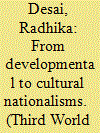

|
|
|
|
|
| Publication |
2008.
|
| Summary/Abstract |
That developmental and cultural nationalisms had opposite foci should not imply that developmental nationalisms comprised only political economy and cultural nationalisms only cultural politics. It does mean, however, that within each of these historical types of nationalism (and presumably other such historical categories may be elaborated by improving the still rudimentary framework we propose and extending it to other periods in nationalisms' history) both aspects acquired a distinctive settled form. This conclusion indicates the chief ways in which the contributions illuminate, elaborate and interrogate the political economy and cultural politics of developmental nationalisms and of cultural nationalisms and the transitions between them. One-sidedly, it emphasizes coherence, conformity and elaboration, where possible in the voices of the contributors themselves, leaving the task of reflecting on dissonances and the outstanding questions the contributors raise, fittingly perhaps, for a future station in the journey of this idea.
|
|
|
|
|
|
|
|
|
|
|
|
|
|
|
|
| 11 |
ID:
081352
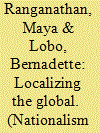

|
|
|
|
|
| Publication |
2008.
|
| Summary/Abstract |
Multinational corporations (MNCs) and their economies of production and distribution are based on the concept that the world is one market where the boundaries of the nation-states do not intrude in the sale of the products. Typically, MNC's products are most often centrally manufactured and distributed throughout the world with often no difference in the products that are sold in different countries. However, while it is found that the products can ignore the national boundaries, the process of marketing them cannot. This paper explores the process by which MNCs employ nationalist ideologies as a marketing tool through an analysis of television advertisements of MNCs in India. India offers a good case study in view of cultural nationalism that dictates her national identity and the path of economic liberalization that the country launched into 15 years ago
|
|
|
|
|
|
|
|
|
|
|
|
|
|
|
|
| 12 |
ID:
142050
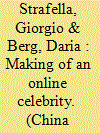

|
|
|
|
|
| Summary/Abstract |
In the ‘society of the spectacle’, according to Guy Debord, ‘smug acceptance of what exists can also merge with purely spectacular rebellion’ and dissatisfaction itself becomes a commodity. Drawing on his reflections on celebrity and the spectacle, this article analyses the highly popular blog of novelist and racing car driver Han Han (born 1982). By doing so, it explores the relation between Han Han’s celebrity and his voice as a social critic. The analysis focuses on how Han Han’s blog thrives on the combination of his celebrity status and Everyman image; how it contrasts ‘anti-intellectualism’ in the tradition of Wang Shuo (born 1958) with elements of literati ideology including moderate loyal criticism and cultural nationalism; and how it negotiates the tension between commercial spectacle and the expression of sociopolitical concerns. The article also argues that unlike citizen journalism, Han Han’s blog relies on editorial commentary on hot topics and acts as a ‘safety valve’ blog. This article aims to contribute to understanding the rise in China’s cybersphere of a celebrity who merges the images of rebel, opinion leader and cultural entrepreneur.
|
|
|
|
|
|
|
|
|
|
|
|
|
|
|
|
| 13 |
ID:
044006
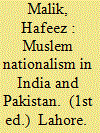

|
|
|
|
|
| Edition |
1st ed.
|
| Publication |
Lahore, People's Publishing House, 1980.
|
| Description |
xv, 355p. hbk
|
|
|
|
|
|
|
|
|
|
|
|
Copies: C:1/I:0,R:0,Q:0
Circulation
| Accession# | Call# | Current Location | Status | Policy | Location |
| 021814 | 954/MAL 021814 | Main | On Shelf | General | |
|
|
|
|
| 14 |
ID:
074090
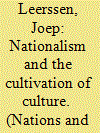

|
|
|
|
|
| Publication |
2006.
|
| Summary/Abstract |
On the basis of an extensive sample of European source material, the article investigates the meaning and importance of 'culture' in cultural nationalism. The author argues that European cultural nationalism in the nineteenth century followed a separate dynamic and chronology from political nationalism. Cultural nationalism involved an intense cross-border traffic of ideas and intellectual initiatives, and its participating actors often operated extraterritorially and in multi-national intellectual networks. This means that cultural nationalism needs to be studied on a supranational comparative basis rather than country-by-country, concentrating on the exchange and transfer of ideas and activities. A working model is proposed which may serve to bring these ideas and activities into focus.
|
|
|
|
|
|
|
|
|
|
|
|
|
|
|
|
| 15 |
ID:
081244


|
|
|
|
|
| Publication |
2008.
|
| Summary/Abstract |
This paper examines the relationship between developmental and cultural nationalism through an extended case study of the Sri Lankan conflict. It highlights, in particular, the deeply political process of the construction of nations in which the usual opposition between politics and an anti-political realm of the nation or culture itself plays an important role. The conflict, it is argued, has to be understood first of all in political terms, as the outcome of a specific history of electoral politics which, from the 1930s on, was structured along 'ethnic' lines. Appeals to the national or the cultural, which often appear in rhetorical opposition to the divisive forces of everyday politics, are nevertheless themselves products of the very political processes they claim to transcend
|
|
|
|
|
|
|
|
|
|
|
|
|
|
|
|
| 16 |
ID:
095090
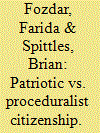

|
|
|
|
|
| Publication |
2010.
|
| Summary/Abstract |
The relationship of the individual to the nation-state is often conceived by theorists in terms of either an emotional ethno-cultural bond (to the traditional 'nation'), or a civic legal-rational connection (to the 'state'). Such a distinction is fundamentally problematic for settler nations with diverse migrant populations. Australia is such a society built on the integration of migrants into an increasingly multicultural polity. The role of citizenship in this process of integration and nation-building is contested. As in other Western democracies, recent moves to increase the value and uptake of citizenship by eligible residents have occurred using discourses of ethno-cultural patriotism. Yet little is known about how migrants to Australia view citizenship. Australian political scientists Betts and Birrell (2007) have argued that most Australians envisage citizenship in terms of monocultural patriotic commitment, while government and the intellectual elite take a more civic 'proceduralist' approach. To explore the validity of this dichotomy, and its relevance to migrants, we analyse migrants' constructions of Australian citizenship from two sources, a government website and interviews, finding evidence of both patriotism and proceduralism, but significant overlap in the way the perspectives are articulated. Differences between the data sets, in representations of economic productivity, identity and exclusion, are also discussed. We conclude that everyday conceptualisations of Australian citizenship by migrants combine patriotism and proceduralism, and indicate a degree of complexity and ambivalence missing in Betts and Birrell's formulation.
|
|
|
|
|
|
|
|
|
|
|
|
|
|
|
|
| 17 |
ID:
081238
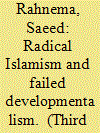

|
|
|
|
|
| Publication |
2008.
|
| Summary/Abstract |
The rise of radical Islamism in recent years does not limit the applicability of the concept of cultural nationalism. Rather the two are intertwined in ways which this article will attempt to highlight. Islam took specific national forms as modern nation-states arose and the contemporary resurgence of radical Islamism also follows that modern pattern. I examine the emergence of the three most important movements in the Islamic world, namely, the Muslim Brotherhood in Egypt, Jama'at-e Islami in Pakistan and Khomeinism in Iran. I argue that imperialism, authoritarianism and the contemporary rise of radical Islamism are closely related. More particularly, the latter is the complex product of failed modernisation programmes, failed developmentalism under the auspices of international capital and in collaboration with the local propertied classes, and corrupt, undemocratic governments throughout the Islamic world. The failure of secular left and liberal nationalist movements to attract mass-based support has also contributed to the strengthening of radical Islamists. The article concludes that the mobilising power and populist appeal of radical Islamists can be challenged effectively only if the social, economic and political factors that give rise to these movements in the first place are eliminated.
|
|
|
|
|
|
|
|
|
|
|
|
|
|
|
|
| 18 |
ID:
153347
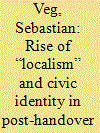

|
|
|
|
|
| Summary/Abstract |
While it was traditionally accepted that Hongkongers shared a form of pan-Chinese cultural identification that did not contradict their local distinctiveness, over the last decade Hong Kong has seen the rise of new types of local identity discourses. Most recently, “localists” have been a vocal presence. Hong Kong has – quite unexpectedly – developed a strong claim for self-determination. But how new is “localism” with respect to the more traditional “Hong Kong identity” that appeared in the 1970s? The present study takes a two-dimensional approach to study these discourses, examining not only their framework of identification (local versus pan-Chinese) but also their mode of identification (ethno-cultural versus civic). Using three case studies, the June Fourth vigil, the 2012 anti-National Education protest and the 2014 Umbrella movement, it distinguishes between groups advocating civic identification with the local community (Scholarism, HKFS) and others highlighting ethnic identification (Chin Wan). It argues that while local and national identification were traditionally not incompatible, the civic-based identification with a local democratic community, as advocated by most participants in recent movements, is becoming increasingly incompatible with the ethnic and cultural definition of the Chinese nation that is now being promoted by the Beijing government.
|
|
|
|
|
|
|
|
|
|
|
|
|
|
|
|
| 19 |
ID:
160506
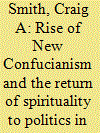

|
|
|
|
|
| Summary/Abstract |
In the past two decades, the revival of New Confucianism in mainland China has accelerated and become a crucial component of the intellectual public sphere. New Confucians have appeared alongside the larger groups of liberals and the New Left, often developing in dialogue or contrast with these intellectual neighbours. As part of the series of research dialogues on mapping the intellectual public sphere in China, this article examines recent discourse from New Confucian intellectuals, particularly dialogue with liberals and the New Left, to highlight the major debates and leading figures that define the cultural nationalist movement of Mainland New Confucianism. We show that, despite the immense difficulty of finding power as a minority voice in contemporary China, an integration of the religious and political dimensions of Confucianism in mainstream Chinese social, political, and intellectual culture remains the primary ideal that fuels and unites these intellectuals in the 2010s.
|
|
|
|
|
|
|
|
|
|
|
|
|
|
|
|
| 20 |
ID:
104105
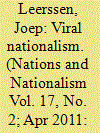

|
|
|
|
|
| Publication |
2011.
|
| Summary/Abstract |
Intellectuals were important to the spread of nationalist ideology in nineteenth-century Europe for a variety of reasons. Firstly, their works facilitated the international spread of the discourse of nationalism; secondly, they mediated between the fields of political institutions and cultural reflection. This article looks at the international mobility and networks of romantic-nationalist intellectuals, and uses the case of August Heinrich Hoffmann von Fallersleben (1798-1874) as an example.
|
|
|
|
|
|
|
|
|
|
|
|
|
|
|
|
|
|
|
|
|